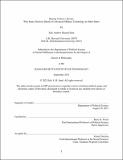Sharing Vulcan’s Secrets: Why States Disclose Details of Advanced Military Technology to Other States
Author(s)
Sand, Erik Andrew Hustad
DownloadThesis PDF (2.344Mb)
Advisor
Posen, Barry R.
Terms of use
Metadata
Show full item recordAbstract
Why do technologically advanced states share cutting-edge military technology – the capability to produce weapons – with other states? Technology is a key component of national power, so sharing technology means making other states more powerful. I identify technology sharing as a unique form of interstate security assistance. Unlike alliances and arms sales, states cannot claw-back the capability technology provides if relations with a recipient worsen. As result, technology sharing’s consequences last for as long as the transferred technology remains relevant.
I create a typology of technology sharing policies based on the ease and breadth of technology transfer they facilitate and explain choices amongst these policies with an original theory called Threats Over Time Theory (TOTT). TOTT predicts decisionmakers share technology when they face severe threats – to either the survival of their state or the organization that they lead. When such threats exist, decisionmakers adjust the liberalness of their desired technology sharing policy based two factors: the likelihood a future adversary may gain the technology because of the sharing – either through a leak or because recipient itself becomes an adversary – and the speed at which the shared technology is likely to become obsolete.
I test TOTT using cases during and between the World Wars – the most recent previous period of multipolar international competition. Using more than 40,000 pages of archival documents, I examine British and American decisions to share technology with each other, Japan, and the Soviet Union. In the process, I produce new or updated histories of these technology transfers.
The findings have implications for scholars’ understanding of how decisionmakers make choices with costs and benefits that vary across time, tradeoff between relative and absolute gains, and prioritize state versus organizational interests. They also provide insight into how policymakers can consider the risks and benefits of technology transfer.
Date issued
2021-09Department
Massachusetts Institute of Technology. Department of Political SciencePublisher
Massachusetts Institute of Technology